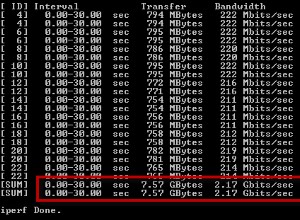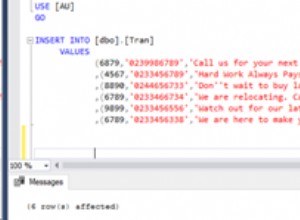Você também pode usar metadados de banco de dados para obter os nomes das colunas. Isso tem a vantagem de que você nem precisa saber os nomes das colunas, em vez disso, eles são recuperados dinamicamente em seu código.
public static List<String> getColumns(String tableName, String schemaName) throws SQLException{
ResultSet rs=null;
ResultSetMetaData rsmd=null;
PreparedStatement stmt=null;
List<String> columnNames =null;
String qualifiedName = (schemaName!=null&&!schemaName.isEmpty())?(schemaName+"."+tableName):tableName;
try{
stmt=conn.prepareStatement("select * from "+qualifiedName+" where 0=1");
rs=stmt.executeQuery();//you'll get an empty ResultSet but you'll still get the metadata
rsmd=rs.getMetaData();
columnNames = new ArrayList<String>();
for(int i=1;i<=rsmd.getColumnCount();i++)
columnNames.add(rsmd.getColumnLabel(i));
}catch(SQLException e){
throw e;//or log it
}
finally{
if(rs!=null)
try {
rs.close();
} catch (SQLException e) {
// TODO Auto-generated catch block
throw e
}
if(stmt!=null)
try {
stmt.close();
} catch (SQLException e) {
// TODO Auto-generated catch block
throw e
}
}
return columnNames;
}
Uma vez que você tenha os nomes das colunas, você pode usá-los como faria normalmente (List.size() obviamente forneceria o número de colunas).
ATUALIZAR:
//I will assume that your values (data to be inserted) is a List of Object types and that it is already populated
List<Object> data = new ArrayList<>();
//you will populate this list
//getting the column names
List<String> columnNames = getColumns("MyTable", "MyDB");
String insertColumns = "";
String insertValues = "";
if(columnNames != null && columnNames.size() > 0){
insertColumns += columnNames.get(0);
insertValues += "?";
}
for(int i = 1; i < columnNames.size();i++){
insertColumns += ", " + columnNames.get(i) ;
insertValues += "?";
}
String insertSql = "INSERT INTO MyDB.MyTable (" + insertColumns + ") values(" + insertValues + ")";
try{
PrepareStatement ps = conn.prepareStatement(insertSql);
for(Object o : data){
ps.setObject(o); //you must pass objects of correct type
}
ps.execute(); //this inserts your data
}catch(SQLException sqle){
//do something with it
}
Este código pressupõe que você passe objetos de tipos corretos para o método PreparedStatement.setObject(Object o). Também é possível recuperar tipos de coluna usando informações da base de metadados e, em seguida, usar essas informações para impor a verificação de tipos, mas isso tornaria seu código muito mais complicado




